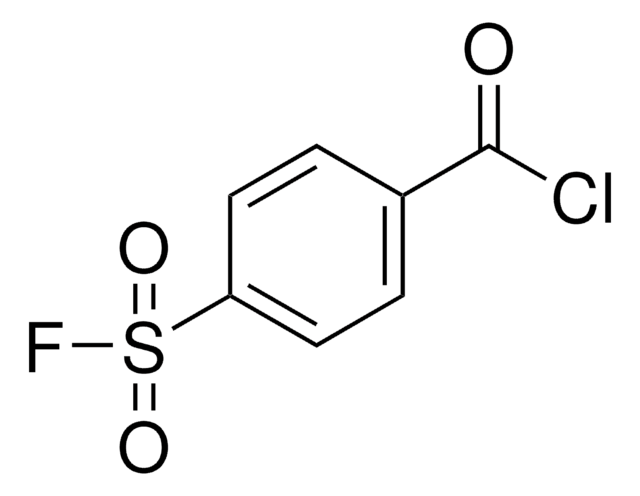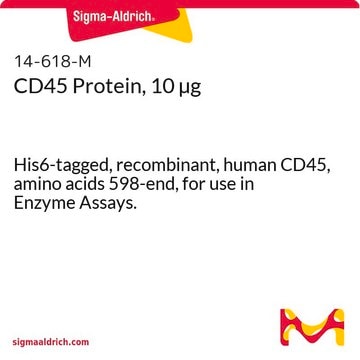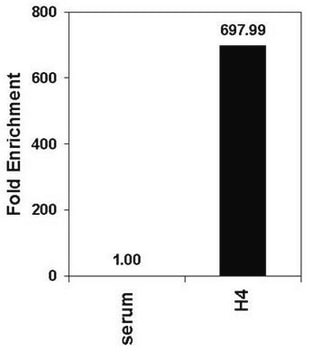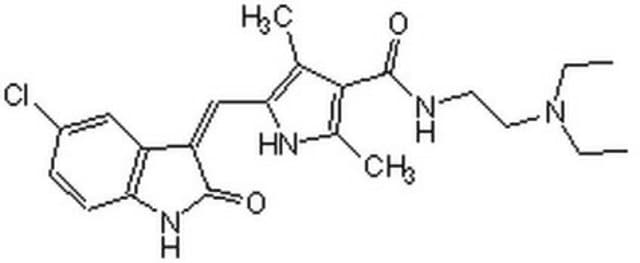14-555-M
Alk Protein, active, 10 µg
Active, N-terminal His6-tagged, recombinant human ALK, residues 1058-end, for use in Kinase Assays.
Synonym(s):
Anaplastic lymphoma kinase
Sign Into View Organizational & Contract Pricing
All Photos(1)
About This Item
UNSPSC Code:
12352202
eCl@ss:
32160405
NACRES:
NA.32
Recommended Products
biological source
human
Quality Level
recombinant
expressed in baculovirus infected Sf21 cells
mol wt
Mw 63.8 kDa
manufacturer/tradename
Upstate®
technique(s)
activity assay: suitable (kinase)
NCBI accession no.
UniProt accession no.
General description
Research area: CELL SIGNALING
Product Source: expressed by baculovirus in Sf21 cells
The anaplastic lymphoma kinase (ALK) is a member of the insulin receptor superfamily of receptor tyrosine kinases. The ALK gene is located on human chromosome 2p23 and shares a high similarity with the leukocyte tyrosine kinase (Ltk). ALK is composed of three domains: an extracellular domain responsible for ligand binding, a transmembrane domain that spans the cell membrane, and a cytoplasmic domain housing the tyrosine kinase activity. The cytoplasmic tyrosine kinase domain of ALK plays a significant role in disease pathologies associated with the gene. Within the structure, there are two short conserved β-strands (β7-β8) housing majority of the catalytic residues. Full-length ALK is specifically expressed in the developing central and peripheral nervous systems during embryogenesis and is associated with the balance of cell proliferation and differentiation.
Product Source: expressed by baculovirus in Sf21 cells
The anaplastic lymphoma kinase (ALK) is a member of the insulin receptor superfamily of receptor tyrosine kinases. The ALK gene is located on human chromosome 2p23 and shares a high similarity with the leukocyte tyrosine kinase (Ltk). ALK is composed of three domains: an extracellular domain responsible for ligand binding, a transmembrane domain that spans the cell membrane, and a cytoplasmic domain housing the tyrosine kinase activity. The cytoplasmic tyrosine kinase domain of ALK plays a significant role in disease pathologies associated with the gene. Within the structure, there are two short conserved β-strands (β7-β8) housing majority of the catalytic residues. Full-length ALK is specifically expressed in the developing central and peripheral nervous systems during embryogenesis and is associated with the balance of cell proliferation and differentiation.
Application
Research Category
Inflammation & Immunology
Inflammation & Immunology
Biochem/physiol Actions
Protein Target: ALK
Target Sub-Family: TK Anaplastic lymphoma kinase (ALK) plays a crucial role in the development of neurons. Binding of ligand to its extracellular domain triggers the activation of the tyrosine kinase that in turn activates the mitogen-activated protein kinase (MAPK) pathway. ALK fusion proteins induce the activation of diverse pathways including Phospholipase C gamma (PLC-γ) and Ras/Extracellular Signal-Regulated Kinase 1/2 (Ras/ERK1/2), which contribute to cell proliferation, while the Janus Kinase/signal transducer and activator of transcription (JAK/STAT) pathway and Phosphoinositide 3-kinase/Protein Kinase B (PI3K/Akt) pathways facilitate cell survival. Notably, ALK has been found to be overexpressed in various human tumors and cell lines such as lymphomas, neuroblastoma, and non-small-cell lung cancer.
Target Sub-Family: TK Anaplastic lymphoma kinase (ALK) plays a crucial role in the development of neurons. Binding of ligand to its extracellular domain triggers the activation of the tyrosine kinase that in turn activates the mitogen-activated protein kinase (MAPK) pathway. ALK fusion proteins induce the activation of diverse pathways including Phospholipase C gamma (PLC-γ) and Ras/Extracellular Signal-Regulated Kinase 1/2 (Ras/ERK1/2), which contribute to cell proliferation, while the Janus Kinase/signal transducer and activator of transcription (JAK/STAT) pathway and Phosphoinositide 3-kinase/Protein Kinase B (PI3K/Akt) pathways facilitate cell survival. Notably, ALK has been found to be overexpressed in various human tumors and cell lines such as lymphomas, neuroblastoma, and non-small-cell lung cancer.
Quality
routinely evaluated by phosphorylation of IGF-1Rtide
Physical form
Ni2+/NTA-agarose
Storage and Stability
6 months at -70°C from date of shipment
Other Notes
For Specific Activity data, refer to the Certificate of Analysis for individual lots of this enzyme.
Legal Information
UPSTATE is a registered trademark of Merck KGaA, Darmstadt, Germany
Disclaimer
Unless otherwise stated in our catalog or other company documentation accompanying the product(s), our products are intended for research use only and are not to be used for any other purpose, which includes but is not limited to, unauthorized commercial uses, in vitro diagnostic uses, ex vivo or in vivo therapeutic uses or any type of consumption or application to humans or animals.
Certificates of Analysis (COA)
Search for Certificates of Analysis (COA) by entering the products Lot/Batch Number. Lot and Batch Numbers can be found on a product’s label following the words ‘Lot’ or ‘Batch’.
Already Own This Product?
Find documentation for the products that you have recently purchased in the Document Library.
The Transcriptional Roles of ALK Fusion Proteins in Tumorigenesis
Ducray SP, et al.
Cancers, 11(8), 1074-1074 (2019)
The role of the ALK receptor in cancer biology
Hallberg B and Palmer RH
Annals of Oncology (2016)
Expression of anaplastic lymphoma kinase in non-Hodgkin's lymphomas and other malignant neoplasms. Biological, diagnostic, and clinical implications.
Wasik, Mariusz A
American Journal of Clinical Pathology, 118 Suppl, S81-S92 (2002)
ALK signaling cascade confers multiple advantages to glioblastoma cells through neovascularization and cell proliferation
Risako C, et al.
PLoS ONE, 12(8), e0183516-e0183516 (2017)
K Pulford et al.
Cellular and molecular life sciences : CMLS, 61(23), 2939-2953 (2004-12-08)
Anaplastic lymphoma kinase (ALK) is a receptor tyrosine kinase, the normal role of which remains to be completely elucidated. Although work carried out in mammals suggests a function in neural development, results from studies in Drosophila indicate an additional role
Our team of scientists has experience in all areas of research including Life Science, Material Science, Chemical Synthesis, Chromatography, Analytical and many others.
Contact Technical Service








